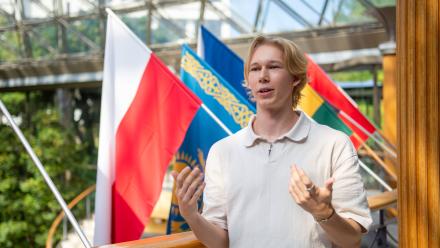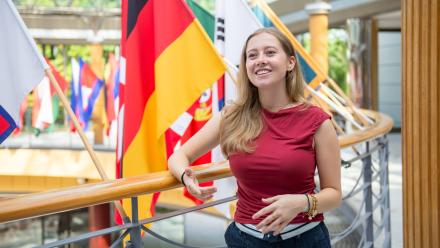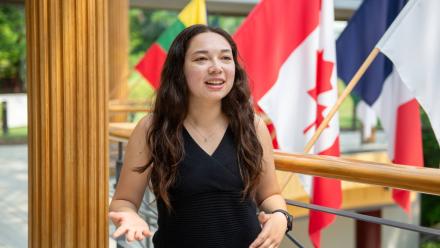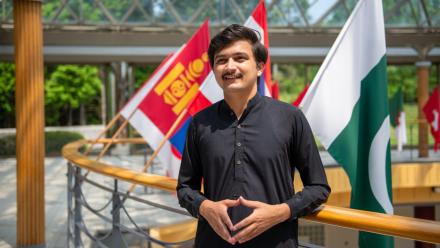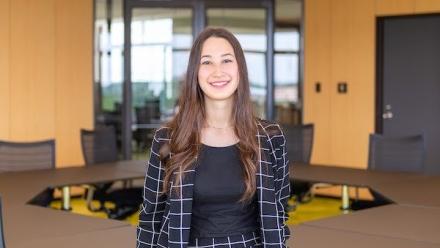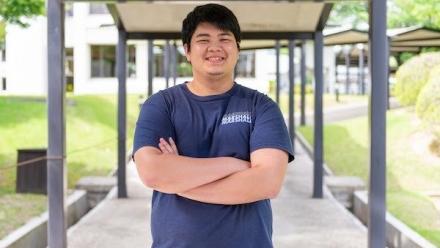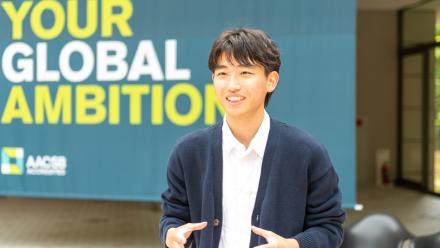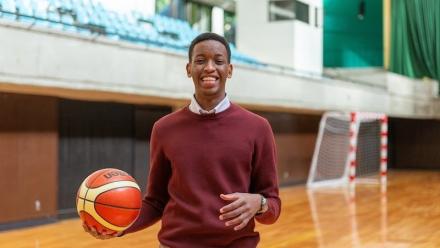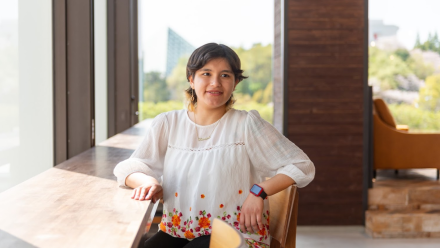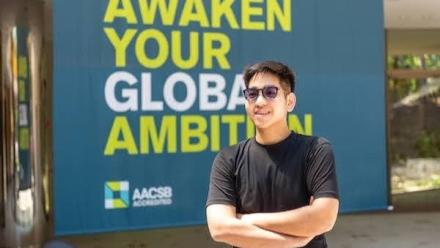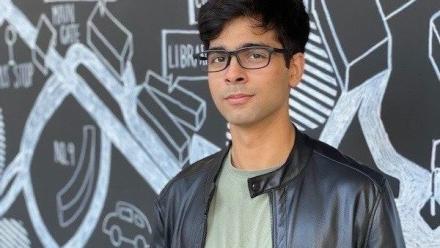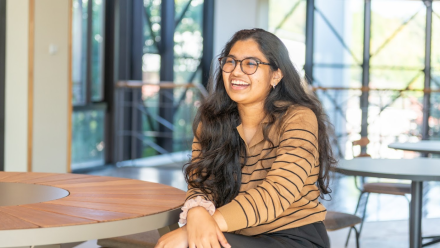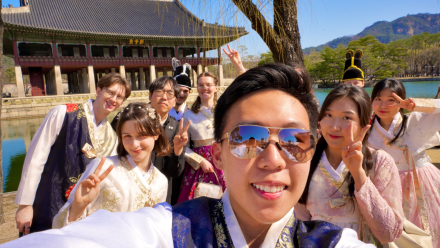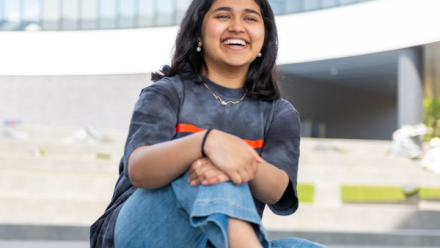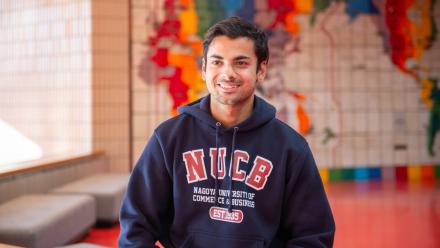We spoke with Keulkhosh, an exchange student from Narxoz University currently on exchange at NUCB, about his experience studying and living in Japan. Since arriving, he has been deeply impressed by the country’s kindness, cleanliness, and attention to detail. At NUCB, he enjoys the lively classroom atmosphere and the interactive nature of the case method, which encourages active listening and the exchange of diverse perspectives.
What was your first impression of Japan when you arrived?
When I first arrived in Japan, I was really surprised by how polite people are and how clean everything is — especially the streets and metro stations. Every time I saw workers, they would greet me with a smile, hand receipts with both hands, and really try to understand and help.
That kind of attitude made me think that there’s so much I can learn from Japan. I’ve been to more than ten countries, but honestly, I’ve never seen a place as clean as Japan. It really shows how people here pay attention even to the smallest details.
Overall, Japan impressed me with its kindness, cleanliness, and the way people notice even the smallest details.
How would you describe the classroom experience (e.g., the case method, discussions, atmosphere)?
The classroom atmosphere is really something special. You’ve got around 50 people all discussing one topic, and it gets super lively.
We usually prepare for the cases in advance, and at first, I was focused on what I wanted to say. But then I realized I was missing a lot by only thinking about my own answer — the real value comes from listening. Once I started doing that, I began to see things from completely different perspectives.
The case method itself is amazing — it pushes you to think critically and see things from different angles. You can’t just talk; you have to listen and understand what others are saying, otherwise the discussion doesn’t move forward.
And the professors are great. They have so much experience and know exactly how to keep everyone involved and make the discussion meaningful.
How do you usually spend a typical day at NUCB?
My days usually start pretty early — I wake up around 5:30. From 6 to 9, I spend time studying and analyzing the cases, and I often think about how I can apply what we learn to real life. Then I have classes during the day, which are always very engaging and full of discussion.
I usually take a short nap for about an hour during the day — it really helps me recharge. After that, I either go to the gym or play football. The gym has every piece of equipment I need, and it’s really convenient — just five minutes away. Every Thursday, we play matches with the NUCB football club — it’s always fun and a nice break from studying.
Keeping this routine helps me stay focused, energized, and get the most out of my day at NUCB.
What’s one thing you’ve learned at NUCB that you think will be useful for your future career?
One thing I’ve learned at NUCB that I think will really help me in my career is how to actively listen while keeping cultural differences in mind. It’s not just about hearing what people say, but really trying to understand their perspective. I’ve also learned the importance of having a spirit of leadership — being proactive, taking initiative, and helping guide a team. I think these skills together make it much easier to work in diverse teams and communicate effectively with people from different backgrounds.
Is there a Japanese food, custom, or habit that you’ve come to enjoy the most?
One thing I really enjoy about Japan is how clean everything is — the streets, the stations, even public spaces. It’s really impressive and shows how much people care about their surroundings. As for food, I’ve really come to enjoy sushi. At first, I was a bit surprised by the raw fish since it’s not something we usually eat in my home country, but now I actually love it. My favorite place is Sushiro — it’s simple, fresh, and really affordable, and I love going there with friends. I think experiencing sushi like this has made me appreciate the care and precision that goes into Japanese cuisine, which is something I’ve really come to enjoy.
What message would you give to students thinking about studying in Japan?
Japan is definitely worth visiting for anyone who wants to learn and grow. From its unique culture to the way daily life is organized, it offers experiences and lessons you can’t find anywhere else. I think living and studying in Japan is the kind of experience that can really shape your personal and professional growth, so it’s definitely something you wouldn’t want to miss.

 Download
Download
 Infosession
Infosession
 Application
Application
 Open Campus
Open Campus
